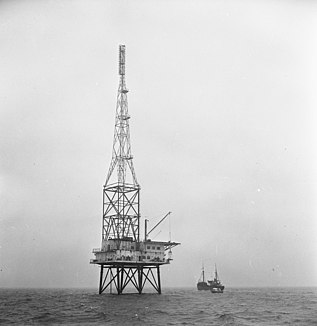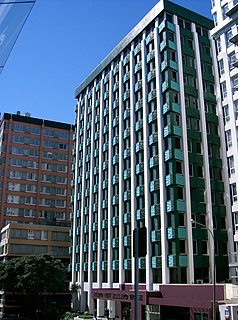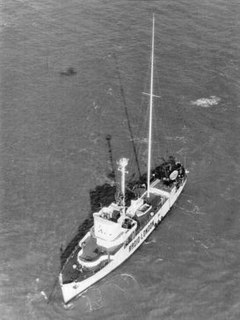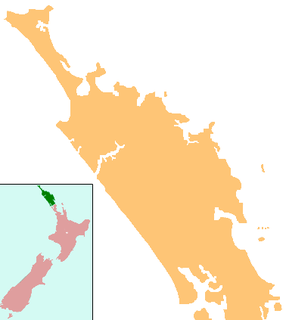
Pirate radio or a pirate radio station is a radio station that broadcasts without a valid license.
There are two types of radio network currently in use around the world: the one-to-many broadcast network commonly used for public information and mass-media entertainment, and the two-way radio type used more commonly for public safety and public services such as police, fire, taxicabs, and delivery services. Cell phones are able to send and receive simultaneously by using two different frequencies at the same time. Many of the same components and much of the same basic technology applies to all three.

Radio New Zealand, commonly known as Radio NZ or simply RNZ, is a New Zealand public-service radio broadcaster and Crown entity that was established under the Radio New Zealand Act 1995. It operates a news and current-affairs network, RNZ National, and a classical-music and jazz network, RNZ Concert, with full government funding from NZ on Air. Since 2014, the organisation's focus has been to transform RNZ from a radio broadcaster to a multimedia outlet, increasing its production of digital content in audio, video, and written forms.
Offshore radio is radio broadcasting from ships or fixed maritime structures. Offshore broadcasters are usually unlicenced but transmissions are legal in international waters. This is in contrast to unlicenced broadcasting on land or within a nation's territorial waters, which is usually unlawful.

Timaru is a port town in the southern Canterbury region of New Zealand, located 157 kilometres (98 mi) southwest of Christchurch and about 196 kilometres (122 mi) northeast of Dunedin on the eastern Pacific coast of the South Island. The Timaru urban area is home to 28,300 people, and is the largest urban area in South Canterbury, and the second largest in the Canterbury Region overall, after Christchurch. The town is the seat of the Timaru District, which includes the surrounding rural area and the towns of Geraldine, Pleasant Point and Temuka, which combined have a total population of 47,900.

The Marine, &c., Broadcasting (Offences) Act 1967 c.41, shortened to Marine Broadcasting Offences Act or "Marine offences Act", became law in the United Kingdom at midnight on Monday 14 August 1967. It was subsequently amended by the Wireless Telegraphy Act 2006 and the Broadcasting Act 1990. Its purpose was to extend the powers of the Wireless Telegraphy Act 1949, beyond the territorial land area and territorial waters of the UK to cover airspace and external bodies of water.

Newstalk ZB is a nationwide New Zealand talk radio network operated by NZME Radio. It is available in almost every radio market in New Zealand, and has news reporters based in many of them. In addition to talkback, the network also broadcasts news, interviews, music, and sports. The network's hosts include Mike Hosking, Kerre McIvor, Marcus Lush, Jack Tame, Simon Barnett and Phil Gifford. Wellington and Christchurch have a local morning show.

Radio London, also known as Big L and Wonderful Radio London, was a top 40 offshore commercial station that operated from 23 December 1964 to 14 August 1967, from a ship anchored in the North Sea, three and a half miles (5.6 km) off Frinton-on-Sea, Essex, England.
Pirate radio exists in most countries in Europe.

Paihia is the main tourist town in the Bay of Islands in the far north of the North Island of New Zealand. It is 60 kilometres north of Whangārei, located close to the historic towns of Russell and Kerikeri. Missionary Henry Williams named the mission station Marsden's Vale and eventually the Paihia became the accepted name of the settlement.

Laser 558 was an offshore pirate radio station launched in May 1984 using disc jockeys from the US. It broadcast from the Panama registered ship MV Communicator in international waters in the North Sea. Within months the station had a large audience due to its strong signal and continuous music mixing current records with oldies. However, insufficient advertising starved the station off the air in late 1985. In 1986 an attempt was made to return as Laser Hot Hits, but the same problems arose.

The Hits is a Hot adult contemporary music radio network, broadcasting to 26 markets across New Zealand. It was set up by Government broadcaster Radio New Zealand in 1993 by consolidating existing stations into a single brand and has been privately owned since 1996. The Hits has had the broadest broadcast reach of any radio network in the country since 1996, and is now available on 40 full-power FM frequencies and 18 iHeartRadio streams.
Radio Caroline is a British radio station founded in 1964 by Ronan O'Rahilly initially to circumvent the record companies' control of popular music broadcasting in the United Kingdom and the BBC's radio broadcasting monopoly. Unlicensed by any government for most of its early life, it was a pirate radio station that never became illegal as such due to operating outside any national jurisdiction, although after the Marine Offences Act (1967) it became illegal for a British subject to associate with it.

RNZ International or Radio New Zealand International, sometimes abbreviated to RNZI, is a division of Radio New Zealand and the official international broadcasting station of New Zealand. It broadcasts a variety of news, current affairs and sports programmes in English and news in seven Pacific languages. The station's mission statement requires it to promote and reflect New Zealand in the Pacific, and better relations between New Zealand and Pacific countries. It is known domestically as RNZ Pacific.
Radio Caroline was a radio station in Timaru, New Zealand.

Radio Luxembourg was a multilingual commercial broadcaster in Luxembourg. It is known in most non-English languages as RTL.

Queen magazine was a British society publication established by Samuel Beeton in 1861. In 1958, the magazine was sold to Jocelyn Stevens, who dropped the prefix "The" and used it as his vehicle to represent the younger side of the British Establishment, sometimes referred to as the "Chelsea Set" under the editorial direction of Beatrix Miller. In 1964 the magazine gave birth to Radio Caroline, the first daytime commercial pirate radio station serving London, England. Stevens sold Queen in 1968. From 1970 the new publication became known as Harper's & Queen after a merger of two publications: Queen and Harper's Bazaar UK, until the name Queen was dropped altogether from the masthead. It is now known as Harper's Bazaar.
Call signs in New Zealand are no longer generally used to identify broadcast stations. However, New Zealand's radio stations were once known by their call signs and would usually broadcast their call signs as a number followed by X, Y, or Z, and another letter. Call signs are regulated internationally by the ITU and nationally by the Ministry of Business, Innovation and Employment (MBIE), formerly the Ministry of Economic Development. The ministry is also responsible for providing policy advice to Government on the allocation of New Zealand's radio spectrum to support, efficient, reliable and responsive wireless telecommunications and broadcasting infrastructure.

Samantha Dubois was a radio presenter on Radio Caroline during the 1970s and again in 1984.

New Zealand Media and Entertainment is a New Zealand newspaper, radio and digital media business. It was launched in 2014 as the formal merger of the New Zealand division of APN News & Media and The Radio Network, part of the Australian Radio Network. It operates 32 newspapers, 9 radio networks and several websites in twenty-five markets across the country, and reaches over 3 million people.













